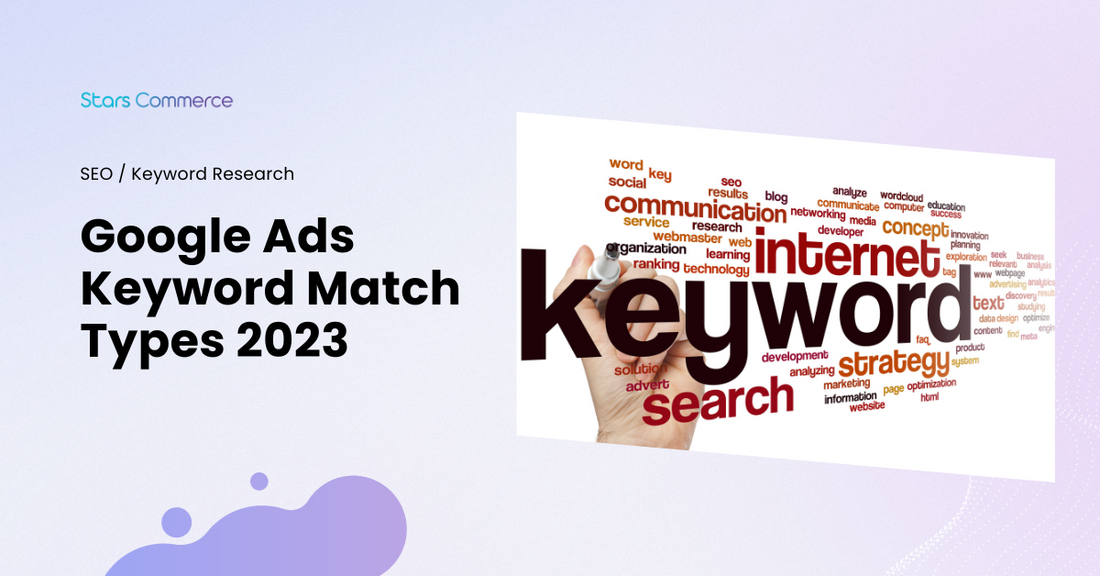Google, much like in most aspects of its operations, is constantly undergoing updates, alterations, or introducing new features (remember the changes to broad match modified?). While some of these updates are openly announced, Google also tends to make discreet adjustments that might easily go unnoticed unless you're meticulously observant.
Keyword match types affect which search queries your ads show for in Google. But they don’t play a role in organic rankings.
Here’s what you need to know for your PPC and SEO campaigns:
What Are Keyword Match Types in Google Ads?
In Google Ads, the keyword match type determines the scope of search queries that could trigger your ads. Your choice affects the potential reach and relevance of your paid search results. These are the three keyword match types:
Broad match: Queries must relate to your chosen keyword (highest reach, lowest relevance)
Phrase match: Queries must include your keyword’s meaning (medium reach, medium relevance)
Exact match: Queries must match your keyword’s meaning (lowest reach, highest relevance)
These keyword match types are also applicable for negative keywords.
This implies that in Google Ads, you have various keyword match types, including broad match keywords, phrase match keywords, exact match keywords, as well as their negative counterparts: broad match negative keywords, phrase match negative keywords, and exact match negative keywords.
Continue reading to gain a deeper understanding of each of these types.
1. Broad Match
Broad match, in the realm of Google Ads, means that your advertisements can be displayed when searchers use related keywords as determined by Google's AI. This match type offers the broadest reach among all keyword match types and considers various relevancy signals to determine when your ads should appear.
Some of these signals include:
-
Other keywords in your ad group
-
The user's previous search history
-
The user's geographical location
-
The content on your landing page
Broad match is the default keyword match type in Google Ads, and it doesn't require any special notation. For instance, if you bid on the keyword "interior paint," your ad might be displayed for a range of queries, such as:
- "Lavender paint" (because your ad group includes "purple paint")
- "Interior design" (as it's thematically related to your keyword)
- "Sherwin-Williams" (due to your landing page mentioning this paint brand)
- "Buy interior paint" (because the query incorporates the meaning of your keyword)
- "Paint for interior" (because the query matches the meaning of your keyword)
While broad match allows your ads to reach a larger audience potentially interested in your products or services, there's a trade-off. It also comes with the risk of showing your ads for less relevant queries.
Google recommends using broad match keywords in conjunction with Smart Bidding, an AI-driven system that adjusts your bids based on expected conversions or conversion value. As with any keyword match type, you only pay when someone clicks on your ad.
2. Phrase Match
Phrase match, within the realm of Google Ads, enables your ads to be displayed when queries include the essence or meaning of your chosen keyword, as determined by Google's AI. This particular keyword match type strikes a balance between expanding your reach and maintaining relevancy.
To specify phrase match keywords in Google Ads, enclose your keyword within quotation marks.
For instance, if you bid on "interior paint" (with the punctuation included), your ad might appear for queries like:
- "Buy interior paint" (since the query encompasses the meaning of your keyword)
- "Paint for living room" (for the same reason)
- "White wall paint" (also because it contains the keyword's meaning)
- "Paint for interior" (as the query aligns with the keyword's meaning)
However, your ad shouldn't appear for more loosely related queries such as "lavender paint" or "interior design."
Phrase match keywords can be particularly valuable for brand and competitor campaigns. With them, you can ensure that queries specifically pertain to your brand name or that of your competitors, thus helping you maintain control and relevance in these campaigns.
3. Exact Match
Exact match, in the context of Google Ads, signifies that your ads are eligible to display solely when queries precisely have the same meaning as your keyword.
To indicate exact match keywords in Google Ads, enclose your keyword within square brackets. For example, if you bid on [interior paint], your ad might be triggered by queries like:
- Interior paint
- Paint for interior
- Room paint
However, your ad should not appear for queries that deviate even slightly from the exact keyword, such as "paint for living room" or "white wall paint."
What Are Keyword Match Types in SEO?
In the realm of SEO, the concept of keyword match types doesn't quite apply in the same way it does in paid advertising.
Google employs highly advanced algorithms to assess the meaning and context of each search query, and it subsequently ranks organic search results according to their relevance, quality, and user-friendliness.
In SEO, you don't have the direct option to explicitly specify which queries you'd like to rank for.
However, strategically incorporating target keywords into your content can significantly enhance your chances of achieving higher rankings.
Google explains its organic keyword matching system like this:
"The most basic signal that information is relevant is when content contains the same keywords as your search query. For example, with web pages, if those keywords appear on the page, or if they appear in the headings or body of the text, the information might be more relevant."
Here are three important things to keep in mind when it comes to SEO:
- Ranking for a keyword doesn't always require its explicit usage.
- Simply incorporating a keyword doesn't assure you'll secure a top ranking for it.
- Whenever you use keywords, ensure that your approach aligns with Google's spam guidelines to maintain a healthy and effective SEO strategy.
Discover the strategies and insights you need to enhance your online presence and make the most of these valuable techniques.
Don't miss out on this vital information! Join us in exploring our blogs and stay tuned for our upcoming post, where we'll delve into the critical topic of "How to Find Keywords for PPC and SEO."




